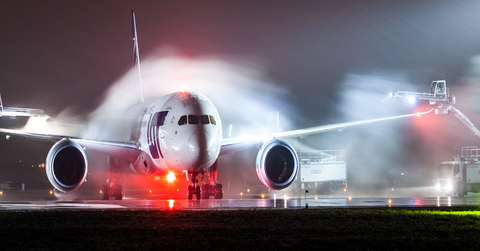Is the Boeing 787 Dreamliner Program in Trouble?
Boeing’s (BA) 787 Dreamliner program might be in trouble. A major customer has canceled billions of dollars’ worth of orders.
Oct. 10 2019, Updated 3:40 p.m. ET

Boeing’s (BA) 787 Dreamliner program might be in trouble. A major customer has canceled billions of dollars’ worth of orders. The Seattle Times reported on October 9 that Russian airline Aeroflot canceled its 2007 order for 22 Dreamliners last month.
The deal was likely to be worth $5.5 billion. However, citing data from Avitas, The Times stated that the real deal’s value was approximately $2.7 billion after considering discounts. The canceled order included four 787-9 Dreamliner variants and 18 smaller 787-8 models.
The cancellations are reflected in Boeing’s recently updated backlog orderbook for its 787 Dreamliner model. The company reduced its total number of 787 backlog orders by 14 last month after adjusting for fresh orders of eight Dreamliners from Air New Zealand.
Boeing’s 787 prospects look dim
In its report, the Seattle Times highlighted that the order cancellations had raised concerns about Boeing’s 787 Dreamliner prospects. The order backlog for the Dreamliner is declining fast, which could disrupt future production profiles for the said model. Since the start of the program in 2007, the company has received 1,450 orders for its Dreamliner jets. Of this total, it’s delivered 894 airplanes. Therefore, as of September 30, the aircraft manufacturer has 556 unfilled orders for its 787 Dreamliners.
Boeing raised its monthly output of the model from 12 units to 14 units in the second quarter. At this monthly output rate, along with declining backlogs, Reuters fears the company will have to cut back on its production rate by 2022. Citing anonymous sources, Reuters revealed that “the planemaker has dozens of unsold or potentially vacant 787 positions on its production line in 2022.”
Reuters also highlighted that demand for long-haul larger planes had softened for several reasons. It identified concerns over global economic growth and rising trade tensions as the main ones. Moreover, the enhanced capabilities of smaller planes to fly long distances are also reducing the need for larger long-haul aircraft.
Rising troubles amid 737 MAX crisis
Problems are arising for Boeing, which is already under pressure due to ongoing difficulties with its 737 MAX model. Its 737 MAX planes have been facing a global flying ban since mid-March following two deadly crashes within five months of each other. The grounding is severely affecting Boeing’s overall aircraft deliveries, as the model accounts for 70% of its total shipments.
The company’s overall airplane deliveries from January to September plunged 53% YoY to 302 units from 568 units. Declining shipments are affecting the company’s financials. In the second quarter, Boeing’s total aircraft deliveries shrank 54% YoY, causing a 35% YoY drop in its total revenue. The company even booked a net loss for the first time in 12 quarters.
We believe its third-quarter results could be even worse, as its total deliveries have declined 67% during the period. Reuters-polled analysts expect its revenue and EPS to fall 20% and 38%, respectively, in the quarter.
However, we believe its top and bottom lines will decline more if it books an after-tax charge similar to the second quarter’s. In the quarter, the company recorded an after-tax charge of $4.9 billion as an estimated cost of compensation for its MAX customers.
There are over 370 Boeing 737 MAX planes worldwide, all of which have been grounded since mid-March. In the US, Southwest Airlines (LUV), American Airlines (AAL), and United Airlines (UAL) together own 72 of them. Since the grounding, these three carriers have canceled over 45,000 flights and have lost millions in terms of seating capacity.
Southwest and American recorded negative impacts of $175 million each on their second-quarter pretax incomes due to the MAX fiasco. According to OAG estimates, the three US airlines will lose over $600 million if MAX remains grounded until October.
Stock performance
Since the Ethiopian Airlines crash on March 10, Boeing has lost 11.3%, or $27 billion in market cap. Before the crash, the stock was a top performer in the Dow Jones 30 with a YTD (year-to-date) gain of 31%. However, as of October 9, its YTD gain has shrunk to 16.3%. Boeing stock has also fallen to 15th place on the Dow Jones 30 component list. The stock has lower returns than the iShares US Aerospace & Defense ETF (ITA), which has risen 27.1% YTD.
